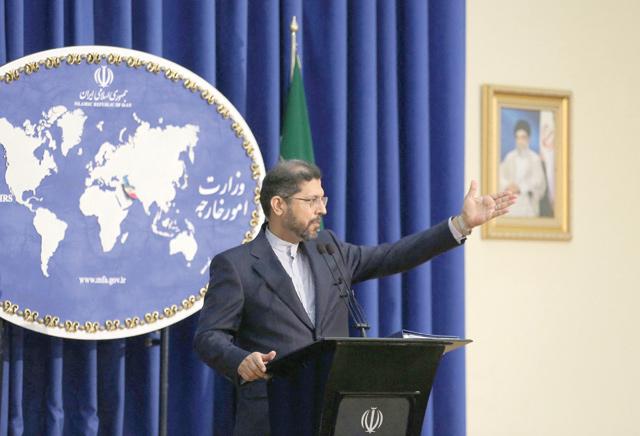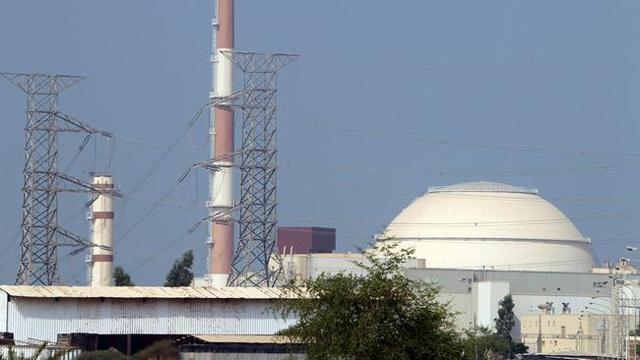You are here
Iran says IAEA chief's visit led to 'significant achievement'
By AFP - Feb 23,2021 - Last updated at Feb 23,2021

Iranian Foreign Ministry spokesman Saied Khatibzadeh gestures during a press conference in Tehran on Monday (AFP photo)
TEHRAN — Iran on Monday hailed a visit by the UN nuclear watchdog chief and a temporary agreement on site inspections as a "significant achievement", amid international efforts to salvage its troubled nuclear deal.
US President Joe Biden, European powers and Tehran are trying to keep alive Iran's 2015 nuclear agreement that has been on the brink of collapse since Donald Trump withdrew from it almost three years ago.
Tehran demands Washington take the first step by scrapping painful sanctions Trump reimposed since 2018, while Washington insists Iran first return to all its nuclear commitments, some of which it has backed away from.
In the standoff, Iran's parliament last year demanded that Tehran by Tuesday this week limit some inspections by the International Atomic Energy Agency (IAEA) if sanctions were not lifted by a deadline two days before then.
IAEA chief Rafael Grossi on Sunday held last-ditch talks in Tehran, where the two sides hammered out a temporary technical deal for up to three months that is in line with the Iranian parliament's demands.
They confirmed that Iran will continue to allow access to UN inspectors to its declared nuclear sites.
But Iran will temporarily suspend so-called "voluntary transparency measures" — notably inspections of non-nuclear sites, including military sites suspected of nuclear-related activity.
Tehran will also deny the IAEA real-time access to footage from surveillance cameras installed at some sites and, if sanctions are not lifted within three months, delete it, Iran's Atomic Energy Organisation has said.
Not 'flying blind'
Grossi said that under the new temporary understanding "there is less access" but that the IAEA will be able to "retain the necessary degree of monitoring and verification work".
The last-minute deal had prevented the IAEA from "flying blind", he said, adding that now "political discussions at other levels can take place".
Iran’s foreign ministry on Monday hailed the outcome, saying it complied with parliament’s demands and “resulted in a very significant diplomatic achievement and a very significant technical achievement”.
Russia also welcomed the agreement as “a tangible positive contribution” to help restart talks between the parties “about Washington’s return to the ‘nuclear deal’”, said Foreign Ministry spokeswoman Maria Zakharova.
The United States and Iran have been bitter enemies for four decades, and Washington accuses Iran of destabilising the region through support for Shiite Muslim militant groups, especially in Iraq, Lebanon and Yemen.
Animosity deepened under Trump, whose diplomatic and economic “maximum pressure” campaign has denied Iran crucial oil revenues and cut it off from global banking, exacerbating its economic woes.
Under Trump, the United States and Iran came to the brink of war several times, most recently early last year when a US drone strike in Baghdad killed top Iranian Gen. Qassem Soleimani.
‘Soberly, cautiously’
Biden has sought to resume diplomacy with Iran and rescue the nuclear deal that was struck with the five permanent members of the UN Security Council and Germany while he served under former US president Barack Obama.
The parties to the deal with Iran saw it as the best way to stop the Islamic republic from building a nuclear bomb — a goal Tehran has always denied.
Iran’s Foreign Minister Mohammad Javad Zarif warned Sunday that if the sanctions are not lifted, his nation would continue scaling back its commitments under the nuclear deal.
The stockpile of “enriched uranium will increase”, he said, stressing that Tehran had the right within the agreement to stop observing commitments “totally or partially” if the other parties fail to honour theirs.
“We are still in the partial phase,” Zarif said. “We can be total.”
The head of US forces in the Middle East, General Kenneth McKenzie, in an AFP interview Sunday urged Iran to refrain from any provocation and not to undertake any “nefarious activities”, in a bid to rebuild trust.
“I would think this would be a good time for everybody to behave soberly and cautiously, and see what happens,” said the head of the US Army Central Command.
Related Articles
TEHRAN — Iran said Sunday it had held "fruitful discussions" with UN nuclear watchdog chief Rafael Grossi in Tehran, ahead of a deadline whe
TEHRAN — Iran said Tuesday it had started to restrict some site inspections by the UN nuclear watchdog in response to the US refusal so far
VIENNA — The UN nuclear watchdog on Monday voiced concern that Iran had not clarified queries over possible undeclared nuclear activity, add


















